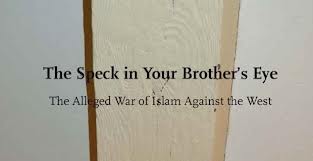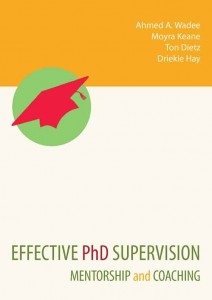The Speck in Your Brother’s Eye – The Alleged War of Islam Against the West – Ideology
 Wilders regards Islam as an ideology: ‘…Islam is not just a religion, as many Americans believe, but primarily a political ideology in the guise of a religion’ (p. 25). ‘(T)the political ideology of Islam is not moderate – it is a totalitarian cult with global ambitions’ (p. 26). If Islam is an ideology, its followers cannot be said to be believers. Still Wilders never refers to Muslims as being adherents of an ideology. He does not give them a new name like ‘Islam ideologists’ for instance. He goes on calling them Muslims but obviously for him the term Muslim has a different meaning than it has for the average reader, who regards Muslims as adherents of a religion.
Wilders regards Islam as an ideology: ‘…Islam is not just a religion, as many Americans believe, but primarily a political ideology in the guise of a religion’ (p. 25). ‘(T)the political ideology of Islam is not moderate – it is a totalitarian cult with global ambitions’ (p. 26). If Islam is an ideology, its followers cannot be said to be believers. Still Wilders never refers to Muslims as being adherents of an ideology. He does not give them a new name like ‘Islam ideologists’ for instance. He goes on calling them Muslims but obviously for him the term Muslim has a different meaning than it has for the average reader, who regards Muslims as adherents of a religion.
The confusion only grows when we learn that Wilders makes a weird distinction between Islam on the one hand and its followers, the Muslims, on the other. He states that ‘there are many moderate Muslims, but that does not change the fact that the political ideology of Islam is not moderate’ (p. 26). ‘We are fortunate that the majority of the world’s 1.5 billion Muslims do not act according to the Koran…’ (p. 26). Islam is evil; Muslims who do not fully implement Islamic ideology are not necessarily evil. Could this mean then that Muslims can be good? This is not what Wilders is saying here but it is what he is implying, either intentionally or not. In the end, making a distinction between the ideology and its followers can only lead to disaster. Because, ultimately, the followers are all potential instruments of this evil ideology and as such a danger to world peace. If Wilders’ view of evil Islam and its potentially evil adherents were to become part of mainstream political thinking and acting, would that not create a huge risk of these followers becoming the objects of violence? Would it not create a situation where the people, or even the authorities, convinced of the risk Muslims constitute, will act accordingly and start oppressing and chasing them? It is for this reason that I find Wilders’ artificial distinction between ideology and its followers a highly dangerous one. And in fact, reading Wilders’ book, in particular chapters 5 and 6 on the history of Islam, and the last chapter where he presents his view on the (future) path to follow in respect to Islam one notices that where he speaks of ‘Islam’, he cannot but mean ‘Muslims’. When he claims that Islam with its jihad caused the deaths of millions of people in India (p. 89), my question to him would be: ‘Who, in your opinion, was it that killed in India? Was it Islam? Or was it Muslims?’ The distinction proposed by Wilders is ultimately untenable. Ideologies do not kill. It is people who kill. His hatred is not directed at an ideology, it is directed at people, at Muslims. Read more
The Speck in Your Brother’s Eye – The Alleged War of Islam Against the West – Solution
 The title of Wilders’ last chapter speaks for itself: How to turn the tide. Having established in the twelve preceding chapters the evil character of the would-be religion of Islam, its devastating effects on the history of the world and the threat it poses to world peace today, it is now time to come up with a solution. The seventeen pages of this final chapter gives us Wilder’s view on how to turn this tide and of the different parts of the solution, I find the following the most telling: ‘Muslims must defeat Islam’ (p. 212). This sounds a bit strange and not really feasible, but from Wilders’ perspective it is quite logical. Islam is not a religion; it is, under all circumstances, an aggressive ideology that seeks to conquer the world. People who follow this ideology are Muslims.
The title of Wilders’ last chapter speaks for itself: How to turn the tide. Having established in the twelve preceding chapters the evil character of the would-be religion of Islam, its devastating effects on the history of the world and the threat it poses to world peace today, it is now time to come up with a solution. The seventeen pages of this final chapter gives us Wilder’s view on how to turn this tide and of the different parts of the solution, I find the following the most telling: ‘Muslims must defeat Islam’ (p. 212). This sounds a bit strange and not really feasible, but from Wilders’ perspective it is quite logical. Islam is not a religion; it is, under all circumstances, an aggressive ideology that seeks to conquer the world. People who follow this ideology are Muslims.
But a real Muslim, in Wilders’ eyes, is one that follows the tenets of Islam and complies with what they require him to do in the full devastating sense of the word. Those who do not strictly and fully follow them are in fact no longer Muslims in the true sense of the word. This then is the answer to the question why Wilders did not assign a new term to Muslims who are not fully ‘observant’. He makes a distinction between Islam and Muslims and now we understand what it is he wants to say. A real Muslim is the one who acts in full compliance with the aggressive ideology of Islam.
Those who do not do so are in fact not Muslims or are so no longer. In Wilders’ own words: ‘People who reject Islam’s violent, intolerant, and misogynistic commandments may be moderates, but they are not practicing “moderate Islam” – they are not practicing Islam at all’ (p. 212). Having read this quote, my question is why Wilders has a problem with what he calls moderate Muslims, if they are in fact, as he says himself, no longer Muslims. If they are not Muslims, they fall outside the scope of Islam, and as such no longer constitute a danger. Naturally, Wilders does not go into this implication of his logic. We will see below that Wilders wants all Muslims, moderate or not, to ‘defeat Islam’. Read more
The Speck in Your Brother’s Eye – The Alleged War of Islam Against the West – The Speck In Your Brother’s Eye
 The title of this pamphlet contains words spoken by Jesus, admonishing us to take a good look at ourselves before we judge others. I believe that Wilders’ and his party’s discourse and ideology are not innovative or new at all, and that they fit seamlessly in the world’s history of religions and ideologies characterized by a strained relationship with violence, be it psychological or physical. I am not going to get into a discussion about what is a religion and what is an ideology. Both can mean a lot to people and both have a special vision or view of the world, the universe, and the questions of life. Both strive for ideal societies, religions all do so with regard to the afterlife and, if possible, here on earth as well; ideologies are restricted to the latter.
The title of this pamphlet contains words spoken by Jesus, admonishing us to take a good look at ourselves before we judge others. I believe that Wilders’ and his party’s discourse and ideology are not innovative or new at all, and that they fit seamlessly in the world’s history of religions and ideologies characterized by a strained relationship with violence, be it psychological or physical. I am not going to get into a discussion about what is a religion and what is an ideology. Both can mean a lot to people and both have a special vision or view of the world, the universe, and the questions of life. Both strive for ideal societies, religions all do so with regard to the afterlife and, if possible, here on earth as well; ideologies are restricted to the latter.
Wilders is very outspoken on Christianity, Islam and the ideas that fuelled the French Revolution. He praises the first and considers the second and third evil by nature. Still, the three of them have more in common than Wilders wants us to believe. In what follows I would like to draw a concise comparison between the three, formulating their respective goals, and subsequently discussing the ways in which the three aim to realize these goals. The discussion I present is in no way exhaustive.
Christianity is characterized by a strong sense of millenarianism. Christ clearly stated in his teachings that his kingdom is not of this earth. It is in heaven and Christians should live their lives in such a way that they deserve to get to heaven in the afterlife. To attain heaven they will have to adhere to the principles of Christianity, which basically entails no more than behaving in accordance with the commandment to love your neighbor as yourself, and do unto others as you would be done by. Love, one could say is the basic tenet of Christianity. Today there are over 2 billion Christians in the world. Read more
Napoleon, the Simpsons and the Dutch
As time marches on, the Dutch will continue to perplex and astonish people throughout the world, although, paradoxically, they will carry on their cultural ideologies of striving to be just average and acting normal because that’s weird enough. People from all parts of the world will continue to envision Holland as this idyllic place full of fairy-tale images, tulips, windmills, cheese, picturesque landscapes and happy-go- lucky inhabitants. People will continue to envision the capital city, Amsterdam, as this insidious place where everyone is high on drugs, engaging in licentious street prostitution and killing their unborn and elderly.
People will also continue viewing the Netherlands as a bastion of liberalism where traditionalism is rejected and where socialistic policies are undermining capitalism and helping to steer the world towards communism. And people will continue to envision the Dutch as these strange people who still walk around in those infamous wooden shoes. The Dutch have been misunderstood since the beginning of their existence; some things just don’t ever change.
Effective PhD Supervision – Mentorship and Coaching
 The complete book online
The complete book online
Chapter One: Chapter One: Introduction
Chapter Two: Guidelines for Supervisors
Chapter Three: Guidelines for Mentors
Chapter Four: Coaching: Charting your own Path
Chapter Five: The Relationship between PhD Candidate and Supervisor
Chapter Six: A Holistic Approach to PhD Support
Chapter Seven: Bibliography and Recommended Reading
Appendices and Acknowledgments
Effective PhD Supervision – Chapter One: Introduction
Foreword by Ms. M. Metcalfe
I am very pleased to present this second edition of the South Africa-Netherlands Research Programme on Alternatives in Development (SANPAD) Supervision Workbook.
The Workbook is yet another contribution by SANPAD towards improving the quality of supervision of doctoral students in South Africa. The Department of Higher Education and Training is particularly encouraged by these efforts, as they continue to enhance the overall quality of our PhD graduates and future academics. PhD qualifications are generally considered to be the first real entry points into the rigorous world of research. As a result, the focus on improving the academic experience of students at this level through improved supervision and mentoring will go a long way towards increasing the overall numbers of PhD graduates at our institutions.
It has become clear that although the number of students enrolling for PhD studies in South Africa has increased over the years, a large proportion of these students do not complete their studies. The reasons for this are many, among them the relationships between supervisors and their students and the overall quality of supervision. The difficulties often stem from the fact that not all supervisors have been properly trained for supervision duties. The mistake that is often made in higher education institutions across the globe is to assume that every academic, by virtue of his or her experience in teaching or research, knows what is required to supervise postgraduate students. Studies show that this is not usually the case and, in fact, academics need proper training and support if they are to effectively carry out their supervision responsibilities. This Workbook will provide a useful guide for both supervisors and PhD candidates on how to structure their working relationships into better interaction and supervision experiences.



